- Home
- Elizabeth Strout
Olive, Again Page 12
Olive, Again Read online
Page 12
“No.” And then Suzanne said, “But, Bernie, it makes me so sad for that poor boy! You know, I’m going to visit him more often. I usually go once a month to see him there in Connecticut, but now that the boys are gone and I have more time, I’m going to go much more often. I just am, oh God, Bernie, that poor child!”
“You go as often as you need to,” Bernie said.
When Suzanne spoke next she sounded exhausted. “Bernie, my father was abusing my mother. She had bruises all over her before she went into that home.”
Bernie sat up straight; a kind of jolt went through him. He said quietly, “I thought that might be true.”
“You did? Why did you think it might be true?”
Bernie closed his eyes, then opened them, and said, “It’s not altogether unusual in those circumstances.” Then he said, “We got her into that place ahead of other people.”
“How?” Suzanne asked.
“Your father had money. That’s how.”
“You helped him do that?”
“I did.” Bernie felt himself blush. He was lying to her by not telling her how her mother had called him to say she was in danger. He opened his mouth, then closed it.
“Oh, Bernie. Well, thank you.” She added, “You probably saved her life.”
“I never saved anyone’s life,” Bernie said.
Suzanne said, “Bernie. Bernie. Do you realize what I came from? Do you realize that? Oh my God, those people! How did I get out alive?” Then Suzanne said, “But you did too. You got out as well.” She added, “Except your parents were murdered, and mine were—well, they almost were murderers, Bernie. And my brother is a murderer. Oh my God.”
Bernie said, “But you got out. Just as you said.”
Suzanne asked, “How did you get out of…where were you born?”
“Hungary.” Bernie spread his hand over his face briefly. He wanted to commend her for everything she had done with her life, to say that she had lived decently by helping those children every day through the AG’s office, and by raising her boys, and by her loyalty to Doyle. But instead he answered her question. “I got out when I was a kid, because my uncle came to America and my parents wanted me to come with him, they said they would join us soon. And then they didn’t.”
“I didn’t know you were born in Hungary. Do you remember your parents at all?”
Bernie glanced around his office before he answered her. It had been a long time since he had spoken of these things to anyone. “Well, I remember my father reading the Torah. I remember my mother setting the table. And I remember her reading to me when I was sick one time and in bed.”
“Oh, Bernie.” Suzanne’s voice sounded stronger now. “Bernie, can I just ask you one last thing?”
“Of course, Suzanne.”
“Do you have any faith? Religious faith, I mean.”
Bernie felt a physical response to this, as though a small wave had just rolled through his chest. He waited and then he said, “You know, I’ve lived for many years as a secular Jew, and I don’t believe I have any faith in that sense.”
“But?” Suzanne asked. “There’s a ‘but’—I can hear it in your voice.”
A tentative earnestness spread through Bernie now. He felt as though he had been called upon to give something of himself that was far outside his purview as a lawyer, and it was something he had never given to anyone, except his wife, vaguely, years ago. “Okay,” he said. “The ‘but’ is this: But do I have faith? I do. The problem is, I can’t describe it. But it’s a faith of sorts. It is a faith.”
“Can you tell me? Oh, please tell me, Bernie.”
Bernie put his hand to the back of his neck. “I can’t, Suzanne. Because I don’t have words to describe it. It’s more an understanding—I’ve had it most of my life—that there is something much larger than we are.” He felt a sense of failure; he had failed in telling this.
Suzanne said, “I used to feel that. For years I would have sensations of just what you described. But I can’t really describe it either.” Bernie did not answer, and Suzanne continued. “When I was a kid, and alone—I spent a lot of time alone, you know, when I wasn’t at school—I would take these walks and I would get this feeling, this very deep sensation, and I understood—only the way a kid could understand these things—that it had something to do with God. But I don’t mean God like some father figure, I don’t even know what I mean—”
“I know what you mean,” Bernie said.
“And I kept having that feeling every so often right into my adult life, I never told anybody, because what was there to tell?”
“I understand that completely,” Bernie said.
“But I haven’t had it for a few years, and so I wonder: Did I make it up? But I know I didn’t, Bernie. I never told my husband, I never told anybody. But whenever someone says they’re an atheist, I always privately have this bad reaction, and they give all the obvious reasons, you know, kids get cancer, earthquakes kill people, all that kind of stuff. But when I hear them, I think: But you are barking up the wrong tree.” She added, “But I couldn’t say what the right tree is—or how to bark up it.”
Sitting at his desk, Bernie felt a vague sense of disbelief; everything she was saying was entirely understandable to him.
Then Suzanne added, “I don’t know why I don’t get that feeling—that sensation—anymore.”
Bernie looked out at the river; it had changed, as it always did, it was now a greener color, as the cloud covering went higher up into the sky. “You will,” he said.
Suzanne said, “You know what, Bernie? I’ve thought about this a lot. A lot. And here is the—well, the phrase I’ve come up with, I mean just for myself, but this is the phrase that goes through my head. I think our job—maybe even our duty—is to—” Her voice became calm, adultlike. “To bear the burden of the mystery with as much grace as we can.”
Bernie was silent for a long time. He said finally, “Thank you, Suzanne.”
After another moment Suzanne said, “The only other person I told about those feelings of—well, of God, or something so much bigger—well, I told that creepy therapist, after, you know, after we began— Anyway, you know what he said? He said, Don’t be ridiculous, Suzanne. You were a child mystified by life, and you now think it was God you felt. You were just mystified by life, that’s all. Isn’t that creepy, Bernie?”
Bernie glanced at the ceiling. “Creepy? Yes. He was a very limited man, Suzanne.”
“I know it,” Suzanne said. Then she said, “Do you really think I shouldn’t tell my husband about him? Do you think I can really live with it on my own?”
“People live with things,” Bernie said. “They do. I am always amazed at what people live with.” He added, “And, Suzanne, you just told me your husband doesn’t know about your experience with…with whatever it is we’ve been talking about.”
“You’re right,” Suzanne said. “Bernie, you’re so smart. I love you.”
Bernie said, “And, Suzanne, I love you.” He wished terribly to tell her that he felt better now, that having talked to her in this way his uneasiness had been alleviated somewhat. Instead he said, “One more thing. Now listen to me.”
“I’m listening,” Suzanne said.
He said, “You hang up and have yourself a good cry. Have a cry like you’ve never had in your life. And when you’re done, get yourself something to eat. I bet you haven’t eaten a thing all day.”
“You’re right, I haven’t. And I will eat something, I promise. But I don’t feel like crying anymore, Bernie. I feel…I feel like I could practically sing.”
“Then do that,” he said.
* * *
And Suzanne, sitting in her car at the rest stop on the turnpike, did not sing. But she sat there for a long while, thinking about their conversation. She thought she would never forget it, it
was as though huge windows above her had been smashed—the way the firemen must have smashed the windows of her childhood home— and now, here above her and around her, was the whole wide world right there, available to her once again. She watched as the mother and the young boy got back into their car, laughing at something together. In front of her was a small maple tree, the leaves pink from top to bottom. “Oh, Bernie,” she whispered. “Wow.”
* * *
Bernie sat at his desk, staring out at the river. A kind of quiet astonishment went through him. Somehow, Suzanne had remained uncorrupted; her guilelessness in talking to him was a gift of no small proportion. She was an innocent, this came to her as naturally as breathing, and he felt right now as though her innocence had washed over him, removing some of the areas of disquiet he had gathered over the years in his profession. In a moment he would go downstairs and tell his wife that they need not worry about Suzanne. About the particularities of their conversation he would say nothing; the way Suzanne had helped him would remain his secret. Harmless enough, he thought, standing up, when you considered the variety of secrets people had been keeping to themselves for years.
Light
Cindy Coombs pulled her shopping cart out of the way of a young couple and saw the man look at her. She saw him look away, then she saw him look at her again. Somehow the man’s look made her touch the zipper on her winter coat—it was a pale-blue quilted coat and the zipper was halfway open—and she walked past the two of them down the aisle even though what she needed—two cans of tomato soup—was exactly where the couple was standing. Up the next aisle she went, slowly, the shopping cart, with its wobbly wheel, making a bumping sound. In her cart there was milk and a loaf of bread. She stopped and turned toward the raisins, unzipping her coat more in order to tighten her belt. Then she kept going, not sure what to do. Tomato soup and—what was it? Butter. In her head she kept saying butter, butter, and tried to think where the butter was, and it was where it always was, over past the milk, many kinds of butter waited.
Where was the kind they always got? Where was it? Cindy leaned forward to get a different kind, what did it matter, and then she saw the kind they usually got, and as she leaned over to get it, she started to fall, and caught herself on the handrail of her shopping cart. She pictured her legs as two little stagnant streams, with twigs and dirt; how could they hold her up?
From behind her, a large elderly hand reached and took the butter that Cindy had been reaching for; it got tossed into her cart. Turning, she saw Mrs. Kitteridge standing there, and Mrs. Kitteridge just looked at her, straight in the eye. “Hello, Cindy,” Mrs. Kitteridge finally said. “You’re having a hell of a time.”
Many years ago, Mrs. Kitteridge had taught Cindy in a junior high math class; Cindy had not especially liked her. Cindy said, “I am, Mrs. Kitteridge. I am having a hell of a time.”
Mrs. Kitteridge nodded once, and still she stood there. “Well, let’s figure out what you need, and get you out of here.”
“I need two cans of tomato soup,” Cindy said.
“Let’s get the soup.” Mrs. Kitteridge did not have a cart, just a basket, and she put the basket into Cindy’s cart and took hold of the rail of the shopping cart, but she left room for Cindy to hold it as well; the sleeves of Mrs. Kitteridge’s coat were bright red, and her hands around the rail of the shopping cart were puffy and old-looking. “Where is the damned soup? This place is such a barn these days, you can walk for miles and miles. And it’s a Saturday, so a lot of people are in here.” Olive Kitteridge was a big woman; she spoke almost over Cindy’s head.
“Around the corner here, I think,” said Cindy, and she saw with some relief that the couple who had been standing near the soup had left. Cindy put two cans of tomato soup into her cart, and Mrs. Kitteridge walked with her to the checkout. Cindy paid for her items, put them in the reusable cloth bag she had brought with her, and then she felt compelled to wait for Mrs. Kitteridge, who said, “One second there, Cindy, and I’ll walk you to the car.”
Together they left the place, and in the huge glass doors that slid open—right before they opened—Cindy caught her own image, and she could not believe it. The wool cap on her head did not cover its baldness, and her eyes were sunken so far in she felt the prick of awe. “I don’t think I’ll be coming here again,” she said to Mrs. Kitteridge as she walked to her car. “I only came because Tom wanted me to.”
“Ay-yuh,” said Mrs. Kitteridge; the bag she carried banged against her side.
Around them a sudden gust of wind sent a few twigs swirling, and a muddy plastic bag that had been run over a number of times rose slightly, then dropped back to the ground among slushy car tracks from the old snow. Cindy opened the door to her car, got in, and realized Mrs. Kitteridge was waiting. “I’m okay now. Goodbye, Mrs. Kitteridge.”
The woman nodded, and Cindy did not turn to look at her once she pulled her car out.
The drive seemed interminable, though it was less than a mile, and because it was a Saturday afternoon, it seemed to Cindy that there was more traffic than usual. When she got home she left the car in the driveway, though the door to the garage was open. The Christmas wreath was still on the front door, and she wished Tom would take it down. She must have told him a hundred times that now it was well into February, the Christmas wreath should come down. Cindy put the groceries onto the counter in their cloth bag. “Hi, honey,” she called to her husband, and Tom came into the kitchen and said, “Hey, Cindy— See? You did it.” He took the butter and the soup and the milk from the bag and said, “Want to watch some TV?” She shook her head and moved past him up the stairs. Too late she remembered about the Christmas wreath; she would remind him later.
* * *
Twenty years ago they had built this house. To Cindy it had seemed huge. She had been embarrassed by it as she watched the construction, the basement poured, the two-by-fours going up; she and Tom had seemed too young for such a large house. Cindy had grown up right outside of Crosby, in a house that had been very small; they had had almost no money, she and her mother and her two sisters. Her father had left the family years earlier, and Cindy’s mother worked night shifts at the hospital as a nurse’s aide; it had not been easy. But Cindy had been lucky; she had gone to the university, paying her way and borrowing money. And there she had met her husband, who went on to work in the accounting office at the ironworks where he had been ever since. Only later did Cindy realize that this house they had built was a regular-size house, with three bedrooms upstairs and a living room and dining room and kitchen downstairs. A few years later they built the garage, attached to the house, and instead of that making the place look bigger, somehow it caused the house to seem smaller. A perfect-size house; for years she had thought that. But as the boys reached adolescence, she started to think that the house looked ordinary, and she asked Tom if it could be painted a robin’s-egg blue. The boys had objected; she let it go, and the house had remained white all these years.
Cindy lay down on the bed and looked through the window at the tops of the trees, the limbs bare, and yet there was that funny little soft sun that sneaks around on a cloud-filled afternoon in February—what was it? The bare branches seemed to reach out, reach out, the opposite of shrinking.
* * *
—
When she saw Tom standing in the doorway of the bedroom, his face open, looking to please, absolutely helpless, she said, “You know what I’ve been thinking lately?”
“What, sweetheart?” Tom came into the room and reached for her hand. “What have you been thinking?”
“How I wanted to paint this house blue, and we never did it, because the boys—and you—said no, you didn’t want to.”
Tom’s big face seemed in her eyes to get slightly bigger, and he said, “Well, let’s do it now, sweetheart. We can have the house painted any color you want. Let’s do that!”
Cindy shook her head
.
“No, I mean it.” Tom bent his head down toward her. “It would be fun, sweetie heart. Let’s paint the house.”
“No.” She shook her head again and turned her face away from him.
“Sweetheart—”
“Oh, Tom. Stop. Please. I said no. We are not going to paint the house now.” She waited a moment, then said, “Honey, can you please take down the wreath that’s still on the front door?”
“Right now,” he said, nodding. “Sweetie heart, consider the wreath gone.”
* * *
Before her illness, Cindy had worked as a librarian at the local library. She loved books, oh, did she love books. She loved the feel of them, and the smell of them, and she had loved the semi-quiet of the library, as well as the old people who came sometimes for the whole morning, just to have a place to go. She had liked helping them get online with a computer, or finding the magazine they wanted to read. Most of all, she had loved checking out books, mentioning to people the books she liked; these people would come back and talk to her about the books they had read at her suggestion. Cindy used to read everything, and even now there were books piled on the table beside the bed, books were piled up on the windowsill, and some on the floor as well. She almost had no preference for any kind of book, and she had sometimes thought that odd; she had read Shakespeare and the thrillers of Sharon McDonald, and biographies of Samuel Johnson and different playwrights, silly romance novels, and also—the poets. She thought, privately, that poets just about sat on the right hand of God.
When she was young, Cindy had thought about being a poet—what a silly idea. But as a child she had liked poetry; her third-grade teacher had given her a copy of Edna St. Vincent Millay’s Poems Selected for Young People, and when her little sister colored all over it in red crayon, Cindy hit her. Always this memory caused Cindy deep pain, because of what had happened later to her little sister. But Cindy had memorized all the poems in the book before they were colored over in red, and she felt—somehow—that it had ushered her into a world far away from her tiny home. This was partly because her teacher had told her that Edna St. Vincent Millay had grown up in Maine too, only an hour away; and that the poet, as a young girl, had been raised in poverty. The teacher had been kind in how she said that, and it was not until years later that Cindy realized it was to help her, Cindy, with her own circumstances of need. Cindy had written some poetry, but only for herself; she knew nothing about it, really. Andrea L’Rieux, who was two years younger than Cindy, had become the Poet Laureate of the United States a year ago, and Cindy felt a vast and secret pride that this person from Crosby, Maine, had accomplished such a thing. In truth, Cindy did not always understand the poetry that Andrea wrote. But it was brave; Cindy knew that. The poetry was a lot about Andrea’s life, and Cindy understood, reading it, that she, Cindy, could never have done what Andrea did. She could never have written about her mother in such a way, could never have written down the revulsion she felt at the sight of her mother’s cheeks drawing in as she smoked, nor even could she have written anything about herself.

 The Best American Short Stories 2013
The Best American Short Stories 2013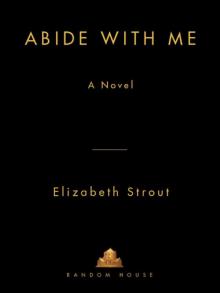 Abide With Me
Abide With Me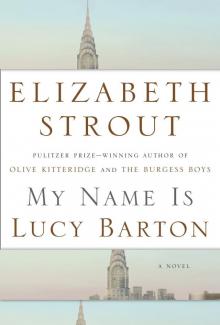 My Name Is Lucy Barton
My Name Is Lucy Barton Olive Kitteridge
Olive Kitteridge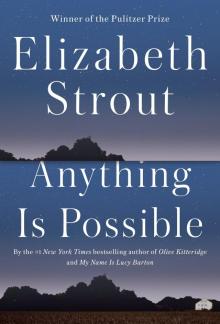 Anything Is Possible
Anything Is Possible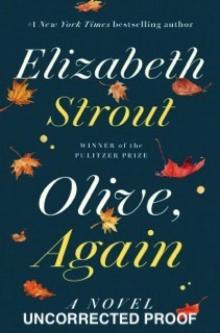 Olive, Again (ARC)
Olive, Again (ARC)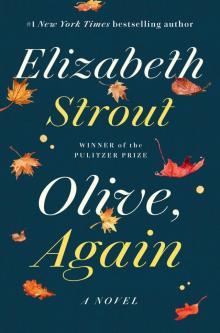 Olive, Again
Olive, Again